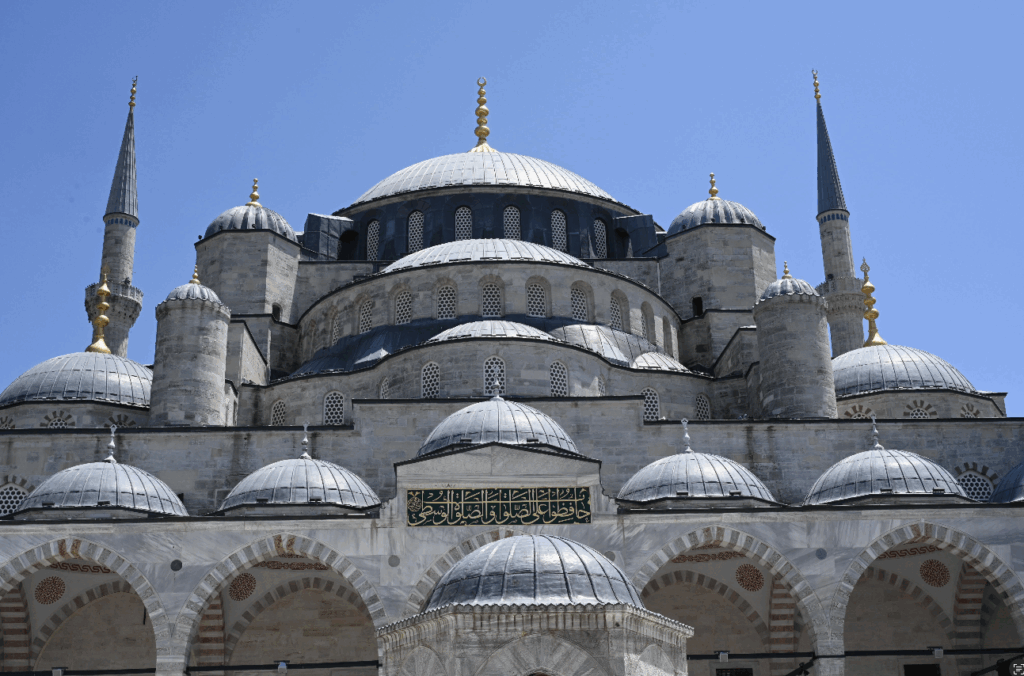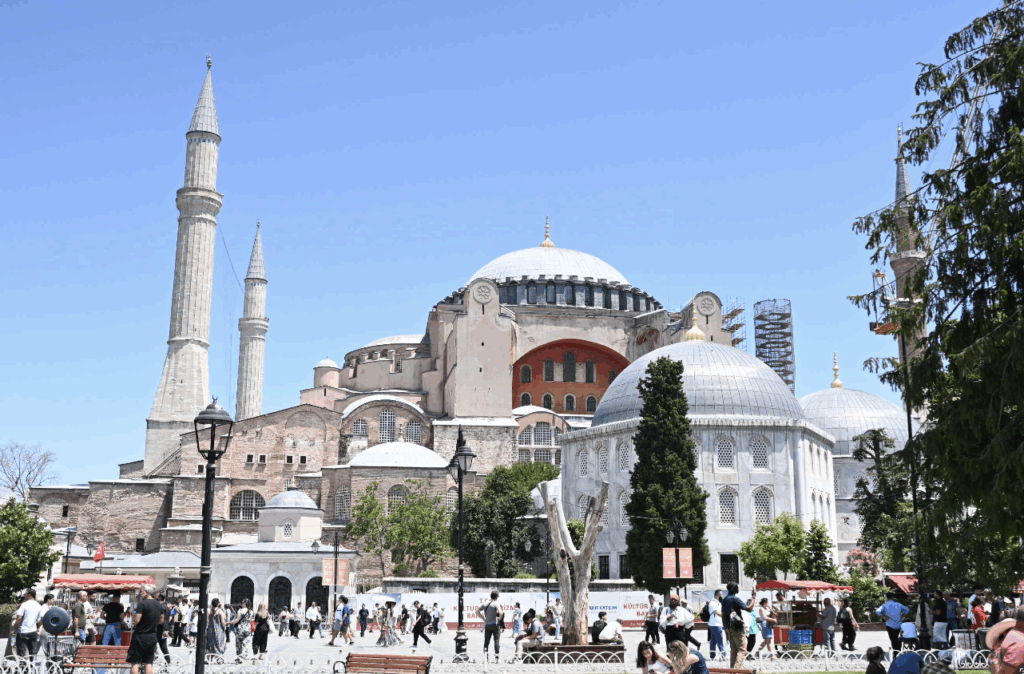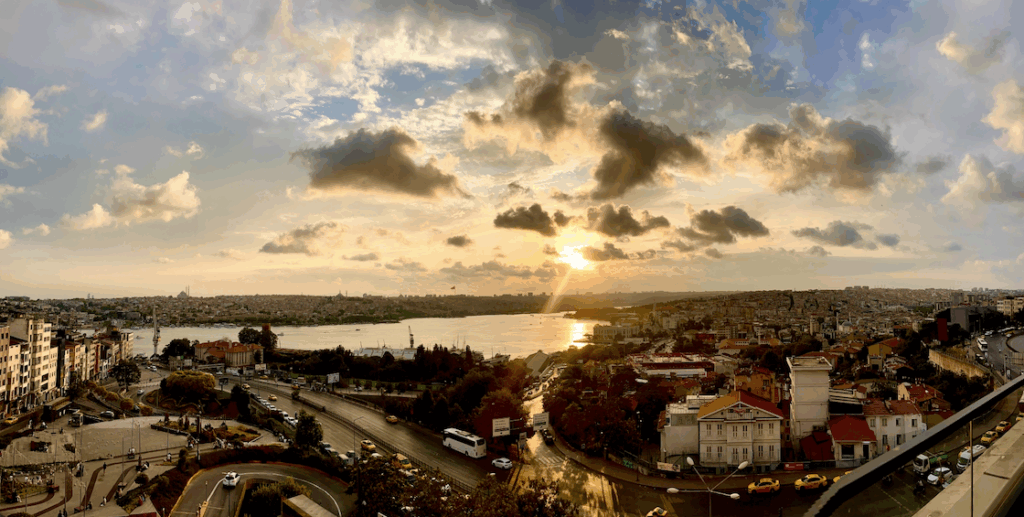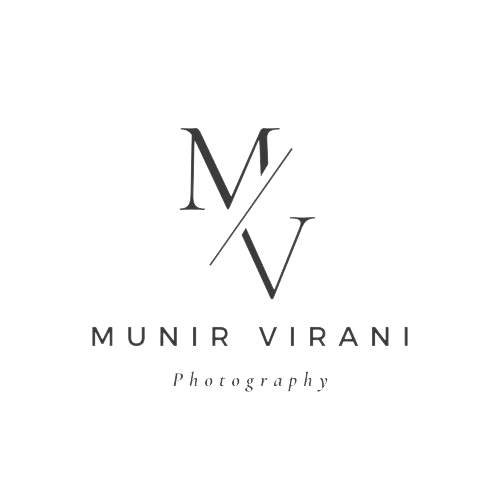“Come, come, whoever you are. Wanderer, worshiper, lover of leaving – it doesn’t matter. Ours is not a caravan of despair.”
— Jalal al-Din Rumi

Some cities rush past you like strangers on a platform. Others slow down, pull up a chair, and offer you tea. Istanbul does something different entirely—it stops time altogether, holds it suspended like dust motes in afternoon light streaming through a café window.
I spent two days there, though it felt like months. Or perhaps minutes. Time moves differently when you’re walking through layers of history so thick you can almost taste them in the air, mixed with the scent of coffee and fresh bread.
The 2 a.m. Etihad flight from Abu Dhabi on Friday, June 27th felt like stepping into a story already in progress. By sunrise, I was breathing Istanbul air—the same air that has filled the lungs of Byzantines and Ottomans, of merchants from Damascus and pilgrims from Mecca, of Kurdish families and Syrian refugees, all of them adding their breath to this vast, collective exhale that is the city. The immigration officer smiled in that particularly Turkish way—genuine warmth mixed with the weariness of someone who has seen every kind of traveler pass through these doors. His stamp in my passport felt like permission to join this great human experiment called Istanbul.

Coffee first. Always coffee first. In fact the shortest ever and famous six-word essay is “Coffee, coffee, coffee, shut up, coffee”. The double espresso at the sleepy airport café was served by a man whose Turkish was accented with something else—Arabic, perhaps, or Farsi. He moved with the economy of someone who has learned efficiency the hard way, and the coffee was strong enough to wake the dead or at least the jet-lagged.
The Taksim Express Havabus wound through neighborhoods where old men sat outside tea houses at 7 a.m., their newspapers folded just so, their conversations picking up exactly where they’d left off the evening before. Through the window, I watched the city layer itself—Ottoman domes rising above Byzantine foundations, modern glass towers catching the morning light, satellite dishes and minarets sharing the same skyline in perfect, impossible harmony.
Mohammed at the As Pera Hotel spoke English with the practiced ease of someone who switches between languages like radio stations, finding the right frequency for each guest. When I arrived well before check-in, exhausted and carrying nothing but a camera bag and the particular disorientation that comes from crossing time zones, he simply smiled and said, “Welcome home.”
Home. The word hung in the lobby air, mixed with the scent of Turkish coffee and something else—maybe it was just the accumulated conversations of a thousand travelers, but it felt like belonging.
After a brief sleep that felt stolen from time itself, I stepped back onto the streets. This is when Istanbul really begins to work on you—not through its monuments, though they are magnificent, but through its pulsating rhythms. The city breathes in languages I couldn’t identify, exhales in the universal language of commerce and community and the simple human desire to sit somewhere comfortable and watch the world go by.
Walking toward Galata Tower, I passed a bakery where the owner—a woman whose hands moved like a pianist’s across the dough—was pulling fresh bread from an oven that looked old enough to have fed the janissaries. She caught me staring and offered a piece, still warm, with a gesture that needed no translation.

I ventured to take the metro to the iconic Grand Bazaar. This isn’t just a market; it’s a parliament of the senses. Here, a Syrian refugee sells spices that taste like home to someone else’s grandmother. There, a Kurdish man demonstrates a traditional saz to a group of German tourists, his fingers finding melodies that bridge every language barrier. The scents—cardamom and cumin, rose water and leather, coffee and tobacco—create a conversation that has been going on for centuries.
I bought nothing, but I lingered everywhere. At a juice stand run by three generations of the same family, the youngest—maybe eight years old—practiced his English while his grandfather squeezed pomegranates with hands that had probably been doing this exact motion for sixty years. The juice was sweet and sharp, like the city itself. In the shadow of Suleymaniye Mosque, I found a small café where the owner spoke Arabic to one customer, Turkish to another, and gestured universally to me. The coffee came in a glass cup, Turkish style, with grounds that settled like sediment at the bottom. I drank it slowly, watching the street life unfold—delivery boys weaving between cars on motorbikes, elderly women carrying groceries in wheeled baskets, children playing football in spaces barely wide enough for the ball. At I Love Chef Murad, the hummus came with bread that was still warm and olive oil that caught the light like liquid gold. The restaurant was full of conversations in half a dozen languages, and somehow this felt not chaotic but natural, like listening to a very complex piece of music where every instrument plays its part.
Twenty-five thousand steps that day ( I broke my own personal daily record), but I wasn’t walking through a city so much as through time itself. Each street corner opened onto a different century, a different empire, a different dream of what a city could be.
The following day I began with a phone call to Zahra, her voice carrying across the miles like a lifeline to another world. But when I stepped outside, this world—Istanbul’s world—reclaimed me immediately. The tram to Sultanahmet was crowded with the usual mix: office workers checking phones, elderly couples holding hands, university students with backpacks full of books, tourists like me clutching guidebooks like prayer books. We moved together through the city’s arteries, carried by the collective rhythm of eight million people going about their daily business of living. Sultanahmet Square breathed with the easy rhythm of a place that has seen everything and absorbed it all. Vendors sold roasted corn from carts that looked like they hadn’t changed design in decades. Families spread blankets on the grass, children chased pigeons in the eternal dance of youth and patience. I sat on a bench and watched gardeners plant daffodils while tour groups flowed around them like water around stones.
Near the Blue Mosque, a group of young Turkish students had set up an impromptu presentation about Islam. They spoke to anyone who would listen—tourists, locals, the curious and the skeptical—with the particular intensity of young people who believe they can change the world one conversation at a time. Their guide, maybe twenty-five, explained the mosque’s history not as tourism but as invitation, as if he were introducing us to a friend. Then came the highlight of my visit – I took off my shoes and walked inside the Blue Mosque. Something shifted. Not dramatically—not the kind of story where Jerry says to George “it was a shift”—but quietly, the way understanding sometimes arrives. The space was filled with people: worshippers kneeling in prayer, tourists moving respectfully along the designated paths, children whispering questions to their parents in languages I couldn’t identify.
The architecture wasn’t just beautiful; it was functional in the deepest sense. Every dome and arch, every piece of calligraphy, every shaft of colored light streaming through stained glass windows worked together to create something that felt less like a building and more like a pause in the world’s conversation. Even the tourists’ whispers seemed reverent, as if the space itself taught appropriate volume.

I stood there for maybe ten minutes, maybe two hours, I will never know as my watch battery died. Time moved differently under those soaring domes. The call to prayer began, that ancient sound that has marked the rhythm of Muslim cities for fourteen centuries, and I felt something settle in my chest. Not conversion, not revelation, just recognition—of something larger than individual faith, larger than personal understanding.
Outside, Hagia Sophia stood like a patient teacher. Built as a cathedral, transformed into a mosque, reborn as a museum, returned to active worship—it had absorbed every prayer, every political decision, every tourist’s camera flash with the same massive grace. I didn’t go inside. Sometimes the outside of something tells you everything you need to know about its interior. Lunch at Loti—serendipitously sharing the name of a dear friend—came with a view of the bustling street and the particular satisfaction of food that connects you to place. The waiter spoke perfect English but slipped into Turkish with the kitchen staff, Arabic with one table, and what sounded like Kurdish with another. He moved between languages like a conductor between instruments, finding the right tone for each conversation. The afternoon dissolved into wandering. Not the purposeful walking of the day before, but the kind of drifting that happens when a city stops being foreign and starts being familiar. I found myself in neighborhoods that weren’t in any guidebook, sitting in cafés where the owner brought me tea without being asked, watching children play in courtyards while their grandmothers watched from windows.

As the sun began to sink slowly, I made my way back to the hotel. From the hotel rooftop, Istanbul spread out like a map of human ambition. The Bosphorus caught the dying light and threw it back toward the sky. Ferries and cruise boats moved between continents like they were crossing neighborhoods.
Somewhere in those millions of lights, families were sitting down to dinner, students were studying for exams, old men were playing backgammon in coffee houses, children were being tucked into bed in apartments that might have been built on Byzantine foundations.

Later, walking through Galata’s narrow streets, I stopped at a juice bar where the owner—a man whose Turkish was accented with something from further east—squeezed oranges while discussing football with his customers. The juice was perfect, sweet and sharp, and the conversation flowed around me in languages I couldn’t understand but somehow followed.
Dinner was simple: bread, cheese, olives, and the particular satisfaction that comes from eating in a place where food isn’t performance but sustenance, where the restaurant owner sits with you not because customer service requires it but because this is how people eat—together, with conversation, with time to digest both food and the day’s experiences.
That evening, as I laid my head on my pillow, I reflected on my two-day visit there. Istanbul isn’t a city you visit; it’s a city you join, briefly, becoming part of its vast, ongoing conversation. It’s a place built by and for migrants—Byzantine Greeks and Ottoman Turks, Balkan refugees and Kurdish families, Syrian artists and German entrepreneurs—all of them adding their voices to this chorus that has been singing for two millennia.
Walking its streets, you realize that diversity isn’t a modern invention but an ancient practice. The same corners that once hosted merchants from the Silk Road now welcome refugees from contemporary conflicts. The same café tables that once served Byzantine officials now host startup meetings and language exchange groups and the eternal Turkish ritual of sitting with friends over small glasses of tea. Time moves differently here because it layers rather than replaces. The city doesn’t demolish its past to make room for its future; it builds up, builds around, builds through. Every street contains centuries. Every café serves both tradition and innovation. Every conversation bridges past and present.
Istanbul is not merely a city; it is a living poem. Once the center of the Byzantine and later the Ottoman Empires, its streets are chapters in human civilization. It stands at the intersection of continents and faiths, ancient yet vividly alive. To walk here is to drift through the dreams of emperors and prophets, dervishes and poets.
It is a place where history isn’t just remembered — it is felt.
And so, I carry these two days not just in photographs, but in the rhythm of my breath and the calm of my thoughts. I know I will return — with my family, with more time — but already, Istanbul has given me something eternal. As Rumi says, “Don’t get lost in your pain, know that one day your pain will become your cure.” In the mystic light of Istanbul, I found not just beauty, but a balm.
Munir – if you enjoyed reading this blog, please leave a comment below





Leave a reply